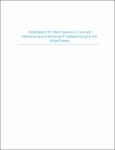Search
Author
- Andrea, Mitofsky (1)
- Brent, Pfifer (1)
- Daryl, Janzen (1)
- M. Fiore, James (1)
- next >
Subject
- Electronic Technology (2)
- Physics (1)
Date issued
Search Results
Overview: This book is an outline of selected topics in introductory algebra-trig-based physics. The worked examples are level-one problems that are straightforward and accessible to novice students. The content of this book is a combination of borrowed materials (primarily from Openstax textbooks) and original writing. This book is and will remain a work in progress. |
Overview: A technician is only as accurate as the measurement equipment they are using. If the equipment is used incorrectly or is faulty, then the measurements will be inaccurate. If the measurements are inaccurate, then the technician will draw the wrong conclusions. To avoid getting inaccurate readings, you need to handle, use, and store meters properly. When you are done using a multimeter, it should always be turned off to extend battery life. |
Overview: This text covers the theory and application of discrete semiconductor devices including diodes, bipolar junction transistors, JFETs, MOSEFETs and IGBTs. It is appropriate for Associate and Bachelors degrees programs in Electrical and Electronic Engineering Technology, Electrical Engineering and similar areas of study. Applications include rectifying, clipping, clamping, switching, small signal amplifiers and followers, and class A, B and D power amplifiers. A companion laboratory manual is available. The text is also available in Open Document Text (.odt) format. |
Overview: This textbook emphasizes connections between theory and application, making physics concepts interesting and accessible to students while maintaining the mathematical rigour inherent in the subject. Frequent, strong examples focus on how to approach a problem, how to work with the equations, and how to check and generalize the result. |



